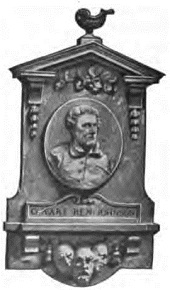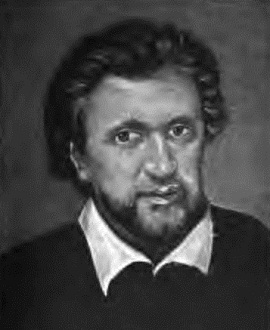| directory |
| home | contact |
|
|||||||||||||||
| search | |||||||||||||||
Ben JonsonFrom Halleck's New English Literature by Reuben Post Halleck. New York: American Book Company, 1913.Life. About nine years after the birth of Shakespeare his greatest successor in the English drama was born in London. Jonson outlived Shakespeare twenty-one years and helped to usher in the decline of the drama. Ben Jonson, the son of a clergyman and the stepson of a master bricklayer, received a good education at Westminster School. In one respect Jonson's training was unfortunate for a poet. He was taught to write prose exercises first and then to turn them into poetry. In this way he acquired the habit of trying to express unpoetical ideas in verse. Art could change the prose into metrical rhyming lines, but art could not breathe into them the living soul of poetry. In after times Jonson said that Shakespeare lacked art, but Jonson recognized that the author of Hamlet had the magic touch of nature. Jonson's pen rarely felt her all-embracing touch. If Jonson served an apprenticeship as a bricklayer, as his enemies afterward said, he did not continue long at such work. He crossed the Channel and enlisted for a brief time as a soldier in the Netherlands. He soon returned to London and became a writer for the theater, and thenceforth lived the life of an author and a student. He loved to study and translate the classics. In fact, what a novice might think original in Jonson's plays was often borrowed from the classics. Of his relations to the classical writers, Dryden says, "You track him everywhere in their snow." Jonson was known as the most learned poet of the age, because, if his plays demanded any special knowledge, no subject was too hard, dry, or remote from common life for him to attempt to master it. He knew the boundaries of Bohemia, and he took pleasure in saying to a friend: "Shakespeare in a play brought in a number of men saying they had suffered shipwreck in Bohemia, where is no sea near, by some hundred miles." Jonson's personal characteristics partly explain why he placed himself in opposition to the spirit of the age. He was extremely combative. It was almost a necessity for him to quarrel with some person or with some opinion. He killed two men in duels, and he would probably have been hanged, if he had not pleaded benefit of clergy. For the greater part of his life, he was often occupied with pen and ink quarrels. When James I ascended the throne in 1603, Jonson soon became a royal favorite. He was often employed to write masques, a peculiar species of drama which called for magnificent scenery and dress,  and gave the nobility the opportunity of acting the part
of some distinguished or supernatural character. Such
work brought Jonson into intimate association with the
leading men of the day.
and gave the nobility the opportunity of acting the part
of some distinguished or supernatural character. Such
work brought Jonson into intimate association with the
leading men of the day.
It is pleasant to think that he was a friend of Shakespeare. Jonson's pithy volume of prose, known as Discoveries Made upon Men and Matter, contains his famous criticism on Shakespeare, noteworthy because it shows how a great contemporary regarded him, "I loved the man and do honor his memory on this side idolatry as much as any." Few English writers have received from a great rival author such convincing testimony in regard to lovable personality. In 1616, the year in which Shakespeare died, Jonson was made poet laureate. When he died in 1637, he was buried in an upright position in Westminster Abbey. A plain stone with the unique inscription, "O Rare Ben Jonson," marks his grave. Plays. Ben Jonson's comedies are his best dramatic work. From all his plays we may select three that will best repay reading: Volpone, The Alchemist, and The Silent Woman. Volpone is the story of an old, childless, Venetian nobleman whose ruling passion is avarice. Everything else in the play is made tributary to this passion. The first three lines in the first act strike the keynote of the entire play. Volpone says: "Good morning to the day; and next, my gold! The Alchemist makes a strong presentation of certain forms of credulity in human nature and of the special tricks which the alchemists and impostors of that day adopted. One character wants to buy the secret of the helpful influence of the stars; another parts with his wealth to learn the alchemist's secret of turning everything into gold and jewels. The way in which these characters are deceived is very amusing. A study of this play adds to our knowledge of a certain phase of the times. In point of artistic construction of plot, The Alchemist is nowhere excelled in the English drama; but the intrusion of Jonson's learning often makes the play tedious reading, as when he introduces the technical terms of the so-called science of alchemy to show that he has studied it thoroughly. One character speaks to the alchemist of- "Your lato, azoch, zernich, chibrit, heautarit,"and another asks: "Can you sublime and dulcify? calcine?Lines like the following show that Jonson's acute mind had grasped something of the principle of evolution: "... 'twere absurdThe Silent Woman is in lighter vein than either of the plays just mentioned. The leading character is called Morose, and his special whim or "humor" is a horror of noise. His home is on a street "so narrow at both ends that it will receive no coaches nor carts, nor any of these common noises." He has mattresses on the stairs, and he dismisses the footman for wearing squeaking shoes. For a long time Morose does not marry, fearing the noise of a wife's tongue. Finally he commissions his nephew to find him a silent woman for a wife, and the author uses to good advantage the opportunity for comic situations which this turn in the action affords. Dryden preferred The Silent Woman to any of the other plays. Besides the plays mentioned in this section, Jonson wrote during his long life many other comedies and masques as well as some tragedies. Marks of Decline. A study of the decline of the drama, as shown in Jonson's plays, will give us a better appreciation of the genius of Shakespeare. We may change Jonson's line so that it will state one reason for his not maintaining Shakespearean excellence: "He was not for all time, but of an age."His first play, Every Man in his Humor, paints, not the universal emotions of men, but some special humor. He thus defines the sense in which he uses humor: "As when some one peculiar qualityUnlike Shakespeare, Jonson gives a distorted or incomplete picture of life. In Volpone everything is subsidiary to the humor of avarice, which receives unnatural emphasis. In The Alchemist there is little to relieve the picture of credibility and hypocrisy, while The Silent Woman has for its leading character a man whose principal "humor" or aim in life is to avoid noise. No drama which fails to paint the nobler side of womanhood can be called complete. In Jonson's plays we do not find a single woman worthy to come near the Shakespearean characters, Cordelia, Imogen, and Desdemona. His limitations are nowhere more marked than in his inability to portray a noble woman. Another reason why he fails to present life completely is shown in these lines, in which he defines his mission: "My strict handSince the world needs building up rather than tearing down, a remedy for an ailment rather than fault-finding, the greatest of men cannot be mere satirists. Shakespeare displays some fellow feeling for the object of his satire, but Jonson's satire is cold and devoid of sympathy. Jonson deliberately took his stand in opposition to the romantic spirit of the age. Marlowe and Shakespeare had disregarded the classical unities and had developed the drama on romantic lines. Jonson resolved to follow classical traditions and to adhere to unity of time and place in the construction of his plots. The action in the play of The Silent Woman, for instance, occupies only twelve hours. General Characteristics. Jonson's plays show the touch of a conscientious artist with great intellectual ability. His vast erudition is constantly apparent. He is the satiric historian of his time, and he exhibits the follies and the humors of the age under a powerful lens. He is also the author of dainty lyrics (p. 137), and forcible prose criticism. Among the shortcomings of his plays, we may specially note lack of feeling and of universality. He fails to comprehend the nature of woman. He is not a sympathetic observer of manifold life, but presents only what is perceived through the frosted glass of intellect. His art is self-conscious. He defiantly opposed the romantic spirit of the age and weakened the drama by making it bear the burden of the classical unities. How to cite this article:______ Related Articles |

|
©1999-2021 Shakespeare Online. All Rights Reserved.